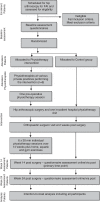Efficacy of a physiotherapy rehabilitation program for individuals undergoing arthroscopic management of femoroacetabular impingement - the FAIR trial: a randomised controlled trial protocol
- PMID: 24571824
- PMCID: PMC3941691
- DOI: 10.1186/1471-2474-15-58
Efficacy of a physiotherapy rehabilitation program for individuals undergoing arthroscopic management of femoroacetabular impingement - the FAIR trial: a randomised controlled trial protocol
Abstract
Background: Femoroacetabular impingement is a common cause of hip/groin symptoms and impaired functional performance in younger sporting populations and results from morphological abnormalities of the hip in which the proximal femur abuts against the acetabular rim. Many people with symptomatic femoroacetabular impingement undergo arthroscopic hip surgery to correct the bony abnormalities. While many case series over the past decade have reported favourable surgical outcomes, it is not known whether formal rehabilitation is needed as part of the management of patients undergoing this surgical procedure. This randomised controlled trial will investigate the efficacy of a progressive physiotherapist-supervised rehabilitation program (Takla-O'Donnell Protocol) in improving health-related quality of life, physical function and symptoms in individuals undergoing arthroscopic management of femoroacetabular impingement.
Methods/design: 100 people aged 16-35 years undergoing hip arthroscopy for symptomatic femoroacetabular impingement will be recruited from surgical practices in Melbourne, Australia and randomly allocated to either a physiotherapy or control group. Both groups will receive written information and one standardised post-operative physiotherapy visit whilst in hospital as per usual care. Those in the physiotherapy group will also receive seven individual 30-minute physiotherapy sessions, including one pre-operative visit (within 2 weeks of surgery) and six post-operative visits at fortnightly intervals (commencing two weeks after surgery). The physiotherapy intervention will incorporate education and advice, manual techniques and prescription of a progressive rehabilitation program including home, aquatic and gym exercises. The control group will not receive additional physiotherapy management. Measurements will be taken at baseline (2 weeks pre-operatively) and at 14 and 24 weeks post-surgery. Primary outcomes are the International Hip Outcome Tool and the sports subscale of the Hip Outcome Score at 14 weeks post-surgery. Secondary outcomes include the Copenhagen Hip and Groin Outcome Score, the activities of daily living subscale of the Hip Outcome Score, the Heidelberg Sports Activity Score, a modified Tegner Activity Scale and participant-perceived overall change.
Discussion: The findings from this randomised controlled trial will provide evidence for the efficacy of a specific physiotherapist-supervised rehabilitation program in improving outcomes following arthroscopic management of symptomatic femoroacetabular impingement.
Trial registration: Australian New Zealand Clinical Trials Registry reference number: ACTRN12613000282785.
Figures
References
Publication types
MeSH terms
LinkOut - more resources
Full Text Sources
Other Literature Sources
Medical
Miscellaneous


